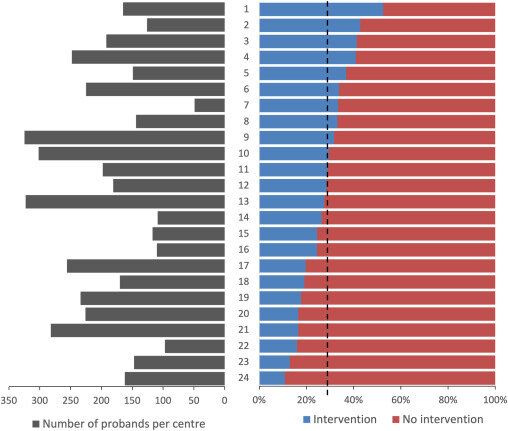
For Lisa Hawker, getting a diagnosis of her daughter Jaydi’s rare genetic condition was life-saving. Jaydi has a rare form of dwarfism which affects around 50 known people across the world. Her early months were defined by long stints in hospital. She had a large number of tests which failed to identify the cause of her condition.
Her clinical geneticist invited her parents to enroll her in an innovative national study, to try and identify the cause. She was four years old when a blood test showed very low numbers of blood cells.
A bone marrow test showed her bone marrow wasn’t producing blood cells normally and her immunity was dangerously low. The doctors looking after Jaydi weren’t sure how best to manage her, but at almost the same time, her genetic results from the largescale Deciphering Developmental Disorders study came in.
Dr. Emma Kivuva, Jaydi’s clinical geneticist at the Royal Devon University Health care NHS Foundation Trust, said, “Jaydi’s results came at just the right time. They explained what was wrong with Jaydi, and this enabled her doctors to look after her appropriately. She was found to have a very rare condition that causes increased susceptibility to infection, and a greater risk of developing cancer, in particular leukemia.”
The team advised a bone marrow transplant to significantly reduce Jaydi’s chance of developing leukemia or a severe infection, and recommended additional vaccinations.
Jaydi’s mother Lisa, a single mum from Seaton, in Devon, said, “I really believe that if she hadn’t had that transplant, Jaydi wouldn’t be alive today. A simple cold could have killed her.”
The Hawkers are among 13,500 families, recruited from 24 regional genetics services across the UK and Ireland, to the Deciphering Developmental Disorders (DDD) study. The study is a collaboration between the NHS and the Wellcome Sanger Institute. The Wellcome Sanger Institute sequenced all the genes in the children’s and parents’ genomes to look for answers, a search which is still ongoing.
All the families had children with a severe developmental disorder, which was undiagnosed despite prior testing through their national health service and likely to be caused by a single genetic change. The study has so far led to diagnoses of around 5,500 people, with 60 new conditions discovered.
Now, new research led by the University of Exeter and the Royal Devon University Health care NHS Foundation Trust, has followed up on the impact of those diagnosed. The new study involved clinical collaborators from all 24 recruitment centers and revealed that 28% (1,183 people) of people in the study were able to change treatment or get further medical testing as a result of their diagnosis.
The study is titled “Large-scale evaluation of outcomes following a genetic diagnosis in children with severe developmental disorders,” and is published in Genetics in Medicine Open.
The study also found that 76% (3,214 people) of those diagnosed were given information or support specific to their condition. More than 20% (880 people) joined patient support groups, such as Unique (https://rarechromo.org/).
Jaydi is among 3% (143 people) who were able to start, review, stop or avoid specific therapies, which can have a major impact on quality of life, and can be lifesaving. Researchers expect this number will be greater in future, as new genetic therapies continue to develop.
Senior author Caroline Wright, Professor of Genomic Medicine at the University of Exeter, said, “Around one in 17 people are affected by a rare genetic disorder, the majority of whom are children, and making the right diagnosis is critical to getting the best treatment and care.
“e now have the technology to make a genetic diagnosis swiftly in around 50% of people affected by rare conditions—but the challenge can be having enough data to understand each condition, as they’re so rare individually. Our study is part of global research giving answers that families need so desperately, to ensure they are on the best management pathway for them.
“t’s so gratifying to hear stories like Jaydi’s, where a genetic diagnosis really is life-changing. Our research will lead to more families being diagnosed as early as possible in future.”
Helen Firth, Honorary Professor of Clinical Genomics at the University of Cambridge and Honorary Faculty Member at Wellcome Sanger Institute said, “Genomic testing is enabling far more people to receive a molecular genetic diagnosis of their rare disorder. These diagnoses are a launch pad to more tailored management and treatment based on the specific genetic diagnosis.
“his paper studied the impact of a genetic diagnosis for patients diagnosed by the DDD study. It provides a template for improving care and support following a genetic diagnosis.”
Sarah Wynn, Chief Executive Officer of Unique, which supports families affected by rare genetic disorders and has been involved in the DDD study from the outset, said, “This study has provided so many families with an explanation for their child’s developmental delay, and has also identified numerous genes involved in causing their conditions.
“Many of these families have waited a long time to get this answer, and they are now able to better understand their child and their needs, enabling access to the appropriate care and support. Families are also understandably desperate for information about how their child may be affected now, and in the future, but for rare conditions such as these, there is often a complete lack of information.
“A vital output of the DDD project has been the collaboration with Unique to produce much-needed family-friendly patient literature, which benefits not only the project participants, but all those subsequently diagnosed.”
Andrew Gwynne, Minister for Public Health and Prevention, said, “Innovative research is vital to increasing our understanding of all illnesses, and saving lives, just like Jaydi’s. Helping people get a final diagnosis faster is one of the key priorities in the UK Rare Diseases Framework and we are continuously committed to making improvements to the health and care system for people living with rare conditions.”
More information:
Harriet Copeland et al, Large-scale evaluation of outcomes after a genetic diagnosis in children with severe developmental disorders, Genetics in Medicine Open (2024). DOI: 10.1016/j.gimo.2024.101864
Citation:
Large-scale study of children with genetic disorders finds huge benefits of diagnosis (2024, October 15)
retrieved 16 October 2024
from https://medicalxpress.com/news/2024-10-large-scale-children-genetic-disorders.html
This document is subject to copyright. Apart from any fair dealing for the purpose of private study or research, no
part may be reproduced without the written permission. The content is provided for information purposes only.


